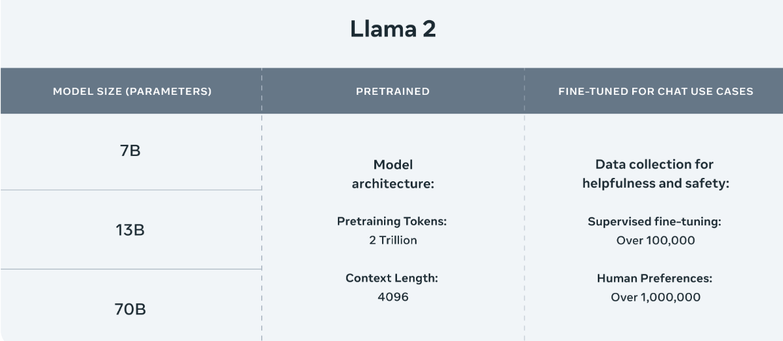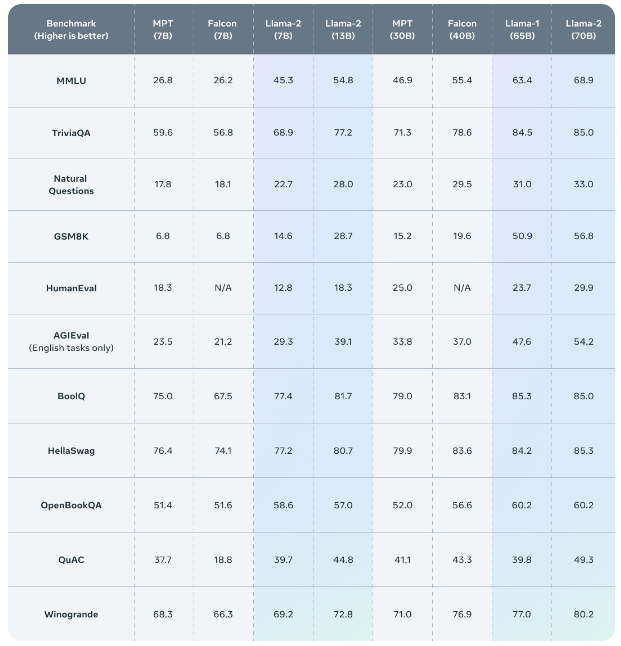Meta Offers Companies Free Use of Llama 2 Language Model
Companies now have access to a large language model on par with proprietary models such as GPT-4 from OpenAI.
.jpg?width=850&auto=webp&quality=95&format=jpg&disable=upscale)
Meta has unveiled the latest version of its popular language model, Llama. Called Llama 2, the model is now free for businesses to adopt, customize and monetize as they please.
Llama 2 comes in three model sizes – seven billion parameters, 13 billion parameters and 70 billion parameters – and is open source, meaning it’s available for research and commercial use. Also available are versions focused on chat applications.
Meta has also released the model weights and starting code for both the pretrained and conversational fine-tuned versions of Llama 2. Users can request access here; the model is also available via Hugging Face. Alternatively, Llama 2 can be accessed through its "preferred" partner, Microsoft, according to a Facebook post by Meta CEO Mark Zuckerberg.
Llama 2 was trained on 40% more data than the first version, with double the context length.

Meta also said Llama 2 "outperforms" other open source language models in reasoning, coding, proficiency and other benchmarks.

Open access to Llama 2 will “open up a world of opportunities for (businesses) to experiment, innovate in exciting ways and ultimately benefit from economically and socially,” Meta said.
The previous iteration of Llama (or LLaMA), released in February, powered some of the most popular open source models and applications, including Alpaca, HuggingChat and Gorilla. It’s designed to act as a base for wider models, with companies able to fine-tune atop it with proprietary data.
Meta said it was “blown away” by the demand for the first Llama version, having received 100,000 requests to access the large language model.
Microsoft + Meta
Microsoft announced at its Microsoft Inspire conference that Llama 2 is available in the Azure AI model catalog. Developers can now build with it. It’s also optimized to run locally on Windows to give AI engineers simpler workflows. Llama 2 is also available on AWS' Amazon SageMaker Jumpstart hub, with other providers coming in the future.
Also announced was the introduction of an open ecosystem between Microsoft and Meta for interchangeable AI frameworks. The work dates back to 2017 when Meta (then Facebook) introduced the Open Neural Network Exchange (ONNX) standard for deep learning models.
The pair pledged to support open AI development, including providing increased access to foundational AI technologies “to the benefit of businesses globally.”
Focus on responsibility
Meta said the Llama 2 models were red-teamed, where staff are tasked with finding gaps within the model’s security architecture and ensure they are safe to use. Third parties were also brought in to generate “adversarial prompts” to help model fine-tuning.
The research paper outlining Llama 2 contains a transparency schematic, outlining the model’s shortcomings as well as how Meta intends to navigate future issues.
Llama 2 users have to agree to an ‘acceptable use’ policy, prohibiting certain use cases, including using the model to generate terroristic content, enable the illegal distribution of information or materials to minors, and create malicious code. The full list can be found here.
Meta also announced the Llama Impact Challenge to encourage developers to use the language model “to solve hard problems,” with further details to come.
Meta pledges open model support
Meta is pledging to support open innovation in AI. It favors opening access because this allows developers and researchers to “stress test” AI models and find issues faster.
"Open source drives innovation because it enables many more developers to build with new technology. It also improves safety and security because when software is open, more people can scrutinize it to identify and fix potential issues. I believe it would unlock more progress if the ecosystem were more open, which is why we're open sourcing Llama 2," Zuckerberg said.
Further, the company took a stand with this statement:
“We support an open innovation approach to AI. Responsible and open innovation gives us all a stake in the AI development process, bringing visibility, scrutiny and trust to these technologies. Opening today’s Llama models will let everyone benefit from this technology."
Signatories to the statement include LinkedIn co-founder turned VC Reid Hoffman, Netscape co-founder and now VC Marc Andreessen, Dropbox CEO Drew Houston, Shopify CEO Tobi Lutke, DoorDash CEO Tony Xu, GitHub co-founder Chris Wanstrath and others.
Notably absent are Turing Award winners Geoffrey Hinton and Yoshua Bengio. Fellow awardee Yann LeCun, Meta’s chief AI scientist, is known to favor an open source approach. Also absent are executives from notable AI companies OpenAI, Google, Anthropic, Microsoft and Stability AI.
OpenAI and Anthropic have opted to keep models like GPT-4 and Claude 2 closed. However, research from Stanford found that closed AI models are less likely to comply with the EU AI Act.
Stay updated. Subscribe to the AI Business newsletter.
Read more about:
ChatGPT / Generative AIAbout the Author(s)
You May Also Like


.jpg?width=700&auto=webp&quality=80&disable=upscale)
.jpg?width=700&auto=webp&quality=80&disable=upscale)
.jpg?width=700&auto=webp&quality=80&disable=upscale)
.jpg?width=300&auto=webp&quality=80&disable=upscale)
.jpg?width=300&auto=webp&quality=80&disable=upscale)
.jpg?width=300&auto=webp&quality=80&disable=upscale)

.jpg?width=300&auto=webp&quality=80&disable=upscale)